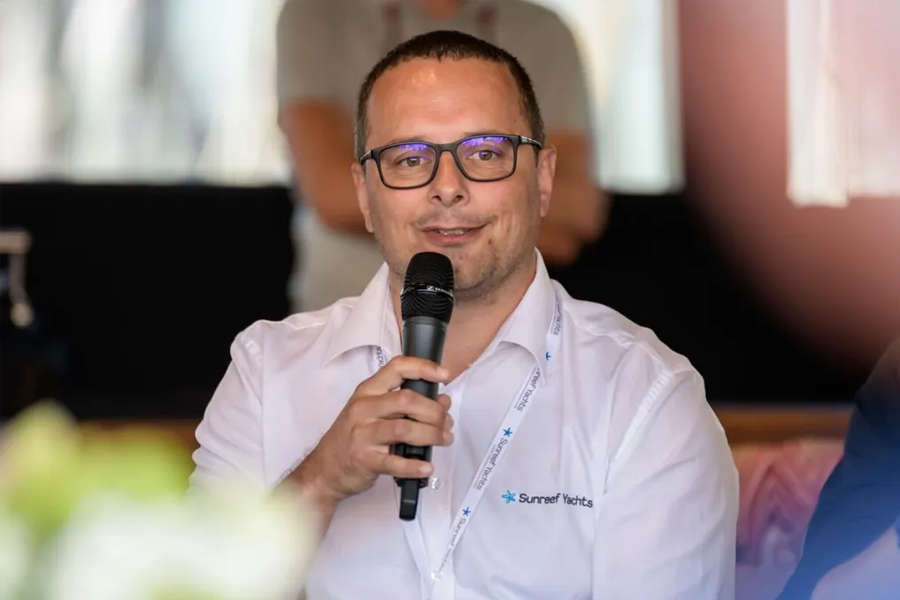 alt="Nicolas Lapp on Sunreef’s green vision"/>
alt="Nicolas Lapp on Sunreef’s green vision"/>
The yachting industry’s biggest and most important challenge for the years to come should be the development of green technologies. I feel that, all in all, we’re not doing enough to reduce the negative impact boating can have on the environment.
Being at sea has always been part of people’s lives. Whether it’s leisure, exploration, transportation or fishing, humans have always had a special connection with the seas. If we love and need the seas so much, we also owe them more respect.
As boat builders, we feel this sense of responsibility should be a fundamental element of boat design, build and use. Companies should do whatever they can to come up with more sustainable craft. Our response at Sunreef Yachts is the Eco range that we had been developing for quite some time before we outlined it globally in April 2020.
My father and I had long discussions with the team about the solutions we could envision for our Eco yachts. After launching two fantastic electric sail cats, we were ready for another big step forward: redefining solar panels for yachts.

The Sunreef 60 E electric sailing catamaran launched in 2019
Some time ago, my father had the idea to fit a mast with solar panels throughout. As we started working on this somewhat eccentric idea, we realised there was a way to integrate solar panels with composite.
This sparked another idea: solar panels all over the hulls, superstructure and every surface possible. It was a gamble, but today our R&D office has the know-how and integration is under way.
All of this wouldn’t be possible without top-quality cells. We found solar cells that ticked all the boxes for us: they are unbelievably light, flexible and shock resistant.
We now have a system that can maximise solar power generation and, on top of that, is easy to maintain and repair. We also wanted it to look nice as we didn’t want any compromise on aesthetics. If you want sustainability to be ‘cool’, the appeal of the product is vital.
Energy storage is just as important as energy generation. We wanted our Eco boats to be as efficient as possible, so we use custom-engineered batteries.

The 70 Sunreef Eco power catamaran
We considered a lot of factors in the process. Of course, capacity is vital and so is density. You don’t want heavy batteries, as this will impact the performance and autonomy of the boat. We reached a density that made our batteries close to 30 per cent lighter than those typically used in the industry.
Lastly, the lifespan of our batteries was also on the priority list. After 10 years of use they will still have 80 per cent of their original capacity. Durable components are what make your boat sustainable.
The manufacturing process is another crucial matter for bringing more sustainability into the yachting world. We’ve been studying the characteristics of basalt and flax fibre for some time and made some important progress towards building furniture using greener composites.
The process of sourcing flax and basalt is energy efficient and clean, and the physical properties of both are amazing. It’s clear to me that this is the way forward for composite yachts and we are already conducting tests to use flax and basalt for bigger structural elements.

The Sunreef 70 Eco sailing catamaran
While working on the Eco range, we did our best to make every aspect of our boats more environmentally friendly. We knew we wanted something more than catamarans with electric engines.
We also thought the moment was right to reassess the way we think of yacht interiors. Our team of designers did a great job sourcing sustainable décor materials. We realised it only takes a little bit of goodwill and some research to be able to provide our customers with a wide selection of sustainable luxury materials.
There are mineral and plant-based structures that can be used for sinks or bathtubs. We can use compressed recycled paper for our countertops. Tiles can be made of recycled monitors, while curtain fabrics can be made of old t-shirts and plastic bottles. It sounds incredible, but all of this is possible without any compromise on quality.
We are on the right path now. I feel optimistic because I can see that our client base shares the same point of view. Ultimately, it’s the owners who will shape the future of the industry. If the demand is there for sustainable yachts, then we’re bound to see a positive response from builders worldwide.
Lapp is R&D Strategy Consultant at Sunreef Yachts, overseeing the green technology created for the Polish builder’s new Eco range of solar-powered luxury catamarans. He has been involved with the company since it was founded in 2002 by his father, Francis, the company’s President, and worked in various departments including design, construction and charter.